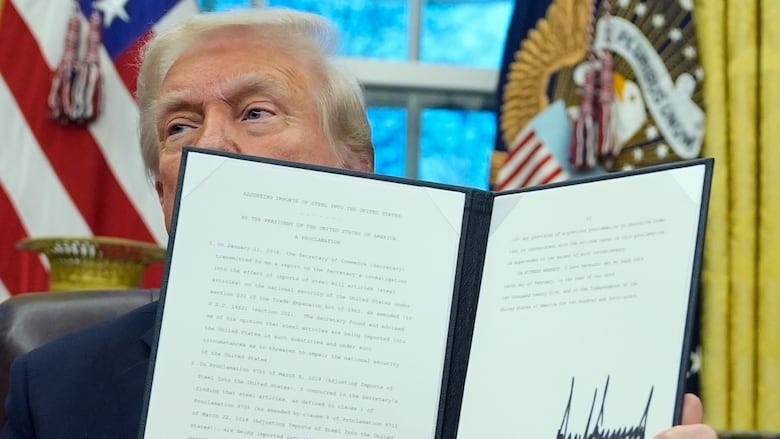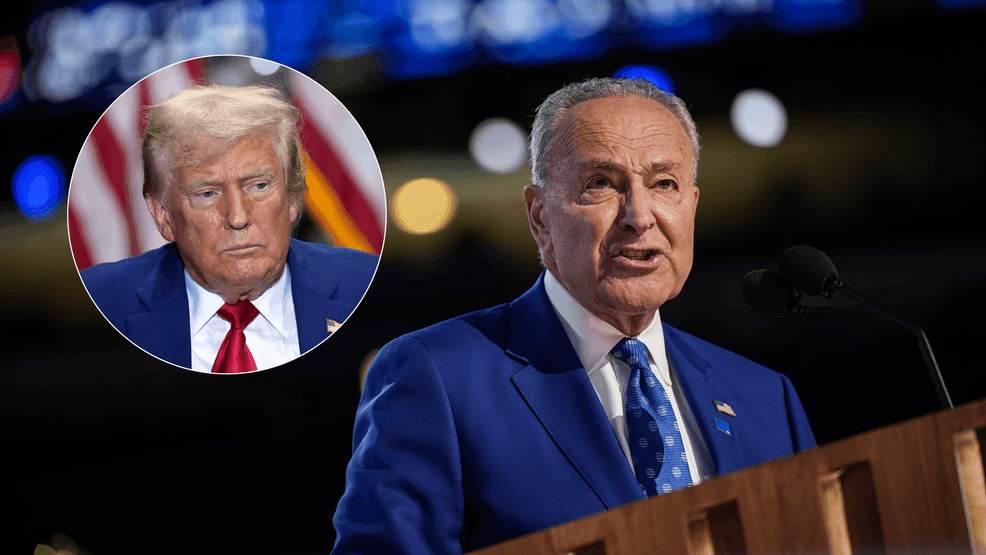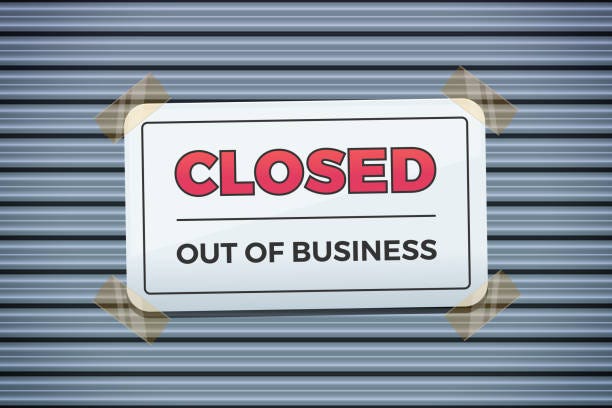Good morning, It’s Tuesday, February 11th. In today’s news, Trump slaps 25% tariffs on steel and aluminum imports, Democratic leader outlines 4-pronged plan to counter Trump administration, Why US officials no longer trust Canada in the fight against fentanyl, Alberta demands Ottawa either repeal 'soft' drug prosecutions or let province take over, and much more.
First time reading the daily blend? Sign up here.
US Slaps 25% Tariffs on Steel and Aluminum Imports, Including from Canada
In a dramatic escalation of trade tensions, U.S. President Donald Trump has announced the reimposition of 25% tariffs on steel and aluminum products, including those from Canada. This move, which takes effect on March 4, follows through on Trump’s long-standing position to prioritize domestic production at the expense of trade partners, including Canada.
Trump’s rationale for the tariffs is simple: the U.S. needs to safeguard its manufacturing jobs by limiting reliance on foreign steel and aluminum. In an inflammatory statement, Trump suggested that Canada should become the “51st state” if it wants to continue exporting these products to the U.S. without facing these new barriers.
The Canadian government, led by Prime Minister Justin Trudeau, has not yet responded to the tariffs, but Industry Minister François-Philippe Champagne condemned the move as “unjustified.” Canadian industry leaders are bracing for the economic impact, with thousands of jobs at risk in key sectors like defence, automotive, and shipbuilding, which rely on Canadian steel and aluminum.
Conservative Leader Pierre Poilievre has urged the government to retaliate by matching the tariffs dollar-for-dollar and funnelling the revenue back into supporting the affected industries. Meanwhile, NDP Leader Jagmeet Singh has emphasized the need for a broader package to support workers impacted by these tariffs, warning that a reactive response would be too late.
But in the face of this looming economic confrontation, Canada lacks the economic strength and leadership required to enter a trade war with the largest empire in the history of humanity. With its economy teetering and leadership embroiled in constant political turmoil, Canada’s ability to counter these aggressive moves is severely limited. Source.
Democratic Leader Schumer Outlines 4-Pronged Plan to Counter Trump Administration
Senate Minority Leader Chuck Schumer unveiled a four-point plan to counter President Donald Trump's sweeping changes in his second term. These changes, implemented swiftly after Trump’s return to the Oval Office, include suspensions of government programs, freezes on foreign aid, and the establishment of a new Department of Government Efficiency (DOGE) led by Elon Musk, which aims to eliminate agencies like the Department of Education and USAID. Schumer's plan includes:
Oversight: Democrats will flood the administration with oversight inquiries, open a whistleblower portal for federal employees, and hold “spotlight” hearings to pressure Republicans and garner public attention to the issues.
Litigation: Schumer plans to leverage the judicial system, with several of Trump’s actions already temporarily blocked by federal courts. Democrats are ready to file amici curiae briefs to support lawsuits against Trump’s moves.
Legislation: Schumer is focusing on the upcoming March 14 funding deadline, seeking to pass a budget or avoid a shutdown. While Republicans are pushing for a budget reconciliation bill, Schumer highlighted the need for bipartisan support to prevent a shutdown.
Communication and Mobilization: Schumer plans to use Democratic committees to maintain party unity, keep the public informed, and organize protests, like the recent demonstration outside the Department of Education.
Likelihood of Success:
While Schumer’s plan is a multi-pronged response, its success hinges on several factors:
Oversight and Public Scrutiny: Democrats can likely generate significant public pressure, but whether it forces Republicans to act or makes Trump back down is uncertain, as many GOP members support his policies.
Litigation: Legal challenges have already yielded some temporary successes, but the overall effectiveness will depend on the speed of judicial processes and the courts’ willingness to halt Trump’s changes permanently.
Legislation: Given the GOP’s slim majority and the contentious nature of the proposed budget, bipartisan cooperation is uncertain. A government shutdown could pressure both sides, but Democrats may struggle to avoid one without more GOP support.
Communication and Mobilization: While protests and communications will rally the Democratic base, broader public support may be limited if Trump's changes align with popular conservative positions.
While Schumer’s plan has the potential to slow or alter some of Trump’s initiatives, the political climate and the deep partisan divide are likely to prevent his efforts from achieving a significant impact.
Why US Officials No Longer Trust Canada in the Fight Against Fentanyl
Canada’s law enforcement agencies, particularly the RCMP and CBSA, have lost the trust of their U.S. counterparts in the fight against fentanyl trafficking and transnational organized crime. Veteran American and Canadian law enforcement officials allege systemic corruption and legal loopholes have obstructed investigations, leading U.S. agencies to limit intelligence-sharing with Canada.
A key example of compromised Canadian law enforcement is Cameron Ortis, a former RCMP intelligence official convicted of leaking sensitive Five Eyes intelligence to criminals. U.S. officials also suspect corruption within CBSA, with some officers retaining security clearances despite American warnings. In joint operations, corrupt Canadian officers continued to appear at meetings, causing U.S. investigators to withdraw in frustration.
Concerns extend to political leadership, as enforcement experts claim Prime Minister Justin Trudeau and a former cabinet minister were seen in proximity to Asian organized crime figures at Liberal fundraisers. Canada’s failure to act against transnational crime networks like Sam Gor—a massive Triad-linked fentanyl syndicate—has further eroded trust. Despite warnings from allies like Australia, Canadian authorities stalled investigations due to bureaucratic obstacles and political interference.
The RCMP’s largest money laundering probe, E-Pirate, collapsed in 2019, revealing systemic failures. U.S. investigators believe Canada is a major hub for fentanyl-related money laundering and drug trafficking, with Asian crime syndicates exploiting lax oversight. Law enforcement veterans argue Ottawa has deliberately downplayed the threat, allowing these groups to gain political influence. Experts warn that without urgent reforms, Canada will continue to be seen as compromised, incapable, and insignificant in global law enforcement. Source.
Alberta Demands Ottawa Either Repeal 'Soft' Drug Prosecutions or Let Province Take Over
Alberta Premier Danielle Smith has demanded that Ottawa either toughen its drug laws or allow Alberta to take over drug-related prosecutions. In an open letter to federal Justice Minister Arif Virani, Smith criticized federal policies, including Bill C-5, which ended mandatory minimum sentences for drug convictions, and a 2020 directive that diverted drug cases from criminal courts. She threatened that if Ottawa does not change course, Alberta will prosecute these crimes itself. Smith's stance aligns with Conservative Leader Pierre Poilievre's push for tougher drug laws, but critics argue that her proposal is unconstitutional, as criminal drug policy falls under federal jurisdiction. More
Poilievre Pledges Arctic Military Base Funded With Foreign Aid Cuts
Conservative Leader Pierre Poilievre announced plans to build a permanent military base in Canada’s Arctic to assert sovereignty, in response to increasing Russian and Chinese influence in the region. The proposed facility in Iqaluit, Nunavut, would house F-35 fighter jets and Poseidon P-8 surveillance aircraft. Poilievre emphasized that funding would come from cutting foreign aid, particularly to “dictators, terrorists, and global bureaucracies.” His broader Arctic strategy includes increasing Canadian Rangers and purchasing two heavy icebreakers. Poilievre's proposals come amid concerns over US President Trump's comments about Canada potentially becoming the 51st U.S. state. More
Trump Warns 'All Hell is Going to Break Out' if Hamas Doesn't Release Hostages by Saturday - If the hostages are not all released by the weekend, the ceasefire agreement between Israel and Hamas should be cancelled, Trump said Monday. More
Hawaii Court Rules Against Insurance Companies in Maui Wildfire, Allowing $4 Billion Settlement to Proceed - More
Romania President Resigns After Impeachment Pressure Over Cancelled Vote - More
China's Retaliatory Tariffs on $14 Billion Worth of US Goods Now in Effect - More
California Nets Nearly 550 Arrests Linked to Human Trafficking - More
Insolvencies in Canada Reach 15-year High, Driven by Small Business Closures
Insolvencies in Canada increased by 12.1% in 2024, with a notable 28.6% rise in business insolvencies, especially among small- to medium-sized businesses in sectors like construction, food services, and transportation. The sharp rise in insolvencies was attributed to high debt loads from COVID-19 relief loans, rising interest rates, and economic pressures like increasing minimum wages. Experts highlighted the struggles of small business owners, pointing to mounting costs and the lack of support. The Conservative Party blamed the Trudeau government for exacerbating the crisis through higher taxes and spending. More
Gold Breaks New Record, Inching Closer to $3,000 - More
NDP Leader Jagmeet Singh Advocates for 100% Tariffs on Tesla While Pushing to Revive Electric Vehicle Incentive Program - More
Supercomputer Predicts the Year Humanity Will Go Extinct—the Timeline Is Set
A supercomputer simulation has predicted a grim future for Earth, revealing that in 250 million years, a new supercontinent, Pangaea Ultima, could form, pushing the planet into extreme conditions. Rising temperatures, volcanic activity, and increased CO₂ levels could make 92% of Earth's land uninhabitable for mammals, including humans. The heat, humidity, and environmental chaos may make survival nearly impossible, though future human civilizations could adapt or leave Earth altogether. This scenario highlights Earth's ongoing changes and the importance of adaptation for survival. More
Paleontologists Uncover a Record-Breaking Colossal “Sea Monster” Skull — Stronger than T-Rex - More
Tiger Woods Pulls out of Genesis Invitational
Tiger Woods has announced he will not play in this week’s Genesis Invitational at Torrey Pines, marking his withdrawal from his first official PGA Tour start since his recent back surgery. Woods cited the recent death of his mother, Kultida, as the reason, stating he's still processing her loss. Despite initially planning to play, Woods shared his gratitude for the support he’s received and hopes to be at the event later in the week. More
Kanye West's X Account Goes Dark After Antisemitic Rants—Now His Website is Selling Nazi Merch - More
Super Bowl Draws Record Average of 126 Million Viewers Across All Platforms - More
Japanese Company Offers Free Drinks and ‘Hangover Leave’ to Attract New Talent
High School Teacher Reportedly Identifies as Cat, Licks Hands and Hisses at Students
On This Day in 1929, the Lateran Treaty was signed between the Holy See and the Kingdom of Italy, which established Vatican City as an independent sovereign state.



















The Beijing Brothers Trudeau and Carney have been exposed…
Amazing reporting. Keep it up.